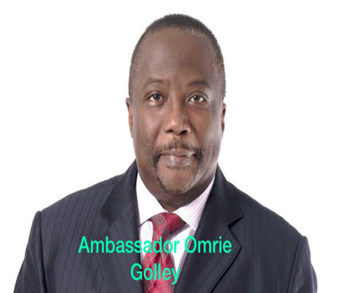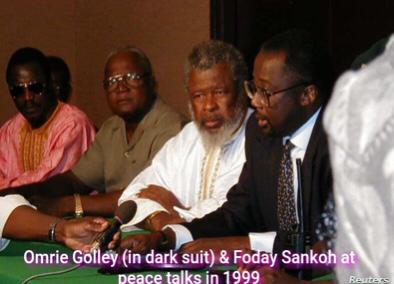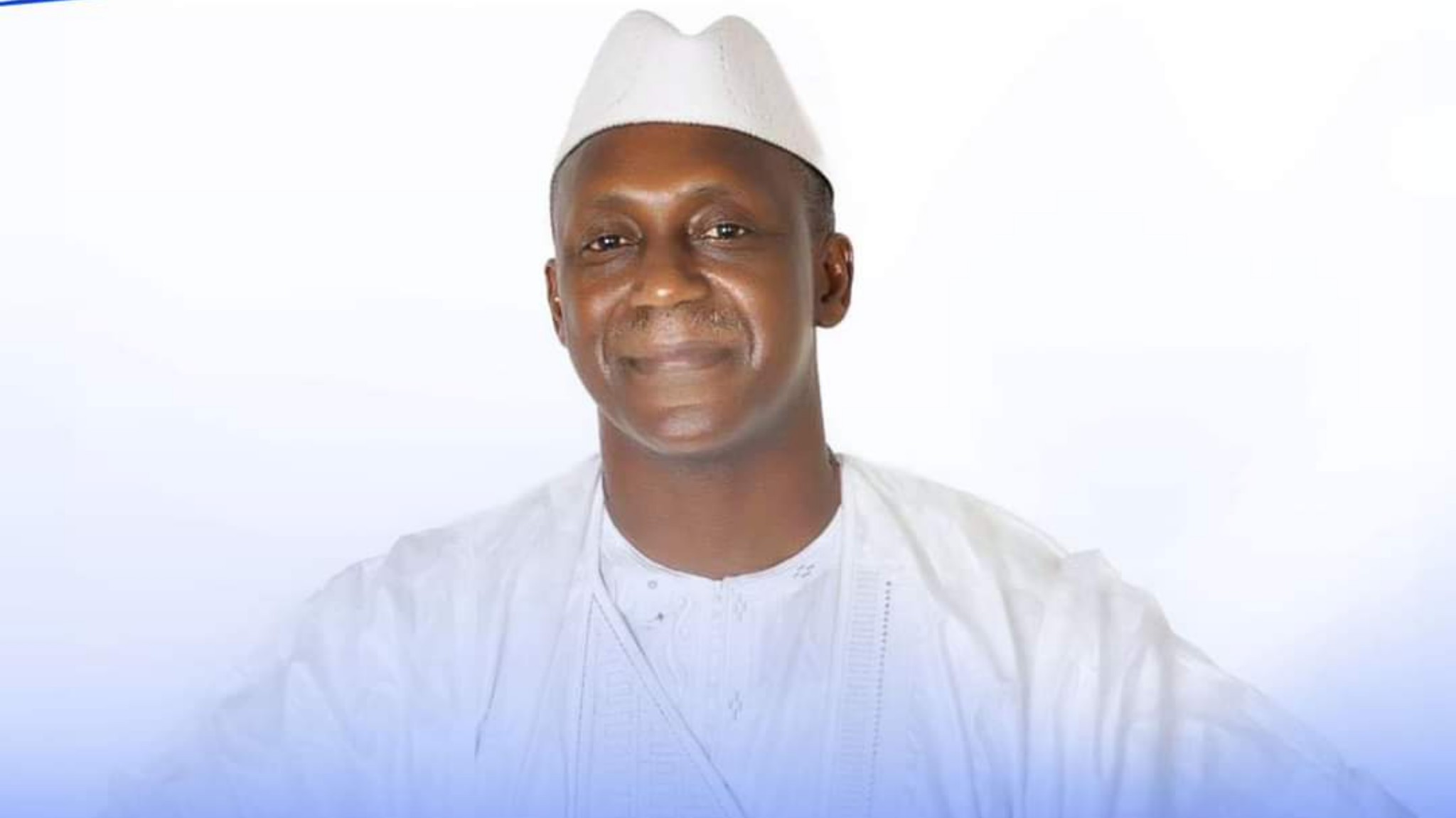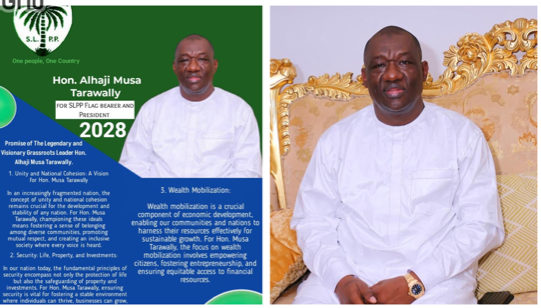
By Noellie Marionette-Chambertin
The Lome Peace Process, in the Republic of Togo, culminated in the signing of the Lome Peace Accord on the 7th July 1999. It was short-lived, and came to an abrupt end, less than a year later on the 8th May 2000, with a violent demonstration at the erstwhile residence of the RUF Leader, Corporal Foday Sankoh.
That demonstration which had been organized by a number of civil groups in Freetown, led to a number of deaths and injuries, and a short-lived escape by the RUF Leader to the hills around Freetown. He was subsequently captured a few weeks later, after what had become popularly known as the ‘May 8th Incident’, jailed, and he died in detention months later.
Looking back in hindsight however, for Ambassador Omrie Golley, who had worked feverishly to assist in convening the peace talks in Lome, it was not difficult to see dark clouds gradually emerging over the whole process. All these happened not long after the signing of the Accord, after a number of occurrences, which he believed threatened the whole peace process.
Ambassador Golley had departed from Lome some two weeks before the actual signing ceremony on the 7th July 1999. He had returned to his family and professional work, but still managed to keep in touch with the main players of the Lome Peace process. These players included the Government of Sierra Leone, the RUF, the United Nations, ECOWAS, and additionally, a number of Governments in the sub region.
Ambassador Golley had not formally relinquished his links with the RUF after he left Lome, in June 1999, which is what he had wanted to do. This was mainly because he had been prevailed upon by a number of the international institutions that had been involved in the peace process, and the host Togolese Government, not to abruptly sever ties formally with the Movement at this stage of the process. It was not until 28th December 1999 however, that Ambassador Golley formally resigned, some five months after the signing of the Accord.
Ambassador Golley’s resignation from the Movement was however not without drama, and rancour emanating from the RUF Leader Foday Sankoh.
Difficulties with the peace process emerged almost immediately after the signing of the Lome Peace Accord. Under the terms of the Accord, the Leader of the RUF was granted the position of Chairman of a newly created Commission, called the Commission of Strategic Resources, National Reconstruction and Development. This courtesy appointment carried with it the rank of Vice President of the Republic of Sierra Leone.

However, President Kabbah, upon returning to Freetown after the signing ceremony, promptly created an additional office of Executive Director for that newly created Commission. The RUF Leader Sankoh believed that the creation of this additional office within the Commission, had significantly devalued his own office. He (Sankoh ) contacted Ambassador Golley in London, and requested him to publicly voice the concerns of the RUF on international media, which Golley duly did.
There were also problems over the allocation of Ministries to members of the RUF by the Kabbah Government, in contravention of the letter and spirit of the Lome Peace Accord.
Foday Sankoh further complained that Kabbah had requested the RUF Leadership to urgently furnish the Government with a list of eligible officials for the four Cabinet positions, together with those of Deputy Ministers, Diplomatic officials, and Chairmen of parastatals, but that he (Sankoh), had not been consulted over the subsequent appointments.
The RUF Leader complained additionally, that Kabbah had not completed the entire allocation of positions to RUF members, in contravention of the Accord, after the subsequent allocation of Cabinet Ministers and Deputies.
In addition, old rivalries between the RUF and former soldiers of the Sierra Leone Army, the Armed Forces Revolutionary Council (AFRC) started to re-emerge and fester. The AFRC, under their former leader Johnny Paul Koroma, had previously joined forces with the RUF, after the May 1997 military coup, referred to in earlier episodes. After the reversal of the coup in January 1998, remnants of the coalition of the RUF and AFRC had retreated to the provinces of the Republic of Sierra Leone. Meanwhile, despite problems between the two groups after their retreat from Freetown in 1998, they had reappeared in 1999, as one entity, as part of the Lome Peace Process.

However, the aftermath of the signing of the Lome Peace Accord in July 1999, appeared to reopen and re-ignite rivalries between the leadership of the two Groups. This in turn led to a series of abductions of United Nations Peacekeepers and renewed hostilities, with the AFRC accusing the RUF principally of being behind the unfortunate upsurge in these attacks, in contravention of the recently signed Accord.
For Ambassador Omrie Golley, who had by this time returned to London, these events greatly troubled him. He saw the emergence of these events as ominous. He was also greatly troubled by the seeming reluctance of the RUF Leader, Foday Sankoh, to return to Freetown from Lome, capital of the Republic of Togo, after the signing of the Peace Accord to assist in its implementation.
Ambassador Golley also received a telephone call in early September 1999, from the erstwhile Togolese Foreign Minister, Kokou Koffigoh, whose Government had hosted the recently concluded Lome Peace Talks. During their conversation, the Minister voiced his Government’s concern at the reluctance of Sankoh to return home, and sought Ambassador Golley’s assistance in persuading Sankoh to return.
Consequently, Ambassador Golley also received calls from United Nations and ECOWAS officials, all of whom appeared concerned at the seeming reluctance of the RUF Leader to return to Freetown. These developments, made it increasingly difficult for Golley to relinquish his position within the RUF, which he had wanted to do, after he had departed Lome, in June 1999.
Meanwhile despite frequent assurances from Foday Sankoh that he would return to the Sierra Leone Capital, Freetown, days after the signing of the Accord, he remained holed up in his Lome Hotel, accusing Kabbah of incidences of bad faith in implementing the provisions of the Peace Accord.
Ambassador Omrie Golley returned reluctantly to Lome, Togo on the 23rd September 1999, after requests referred to above, to assist in persuading Sankoh to return to Freetown, to join the Kabbah Government. On the 28th September 1999, Ambassador Golley accompanied Foday Sankoh to Monrovia, capital city of the Republic of Liberia, on the first leg of his return to Sierra Leone.
It was not until the 3rd October 1999, some three months after the signing of the Lome Peace Accord, that RUF Leader Foday Sankoh accompanied by AFRC Leader Johnny Paul Koroma, and other RUF officials, together with Ambassador Golley, arrived in Freetown to join the Kabbah Government in implementing the provisions of the Lome Peace Accord.
Ambassador Golley remained in Freetown for a short period, after accompanying the RUF Leader to Freetown in early October 1999, and left for London a number of days later. Whilst Golley remained concerned about the increase in hostilities generally, with constant accusations being leveled by both the Government and the RUF leadership against each other, he hoped that with the arrival of Sankoh in Freetown, hostilities would lessen and ultimately cease. Sadly that was not to be the case.
On the 28th December 1999, Ambassador Omrie Golley issued a press release formally relinquishing his position as legal representative and spokesman of the RUF. Golley had returned to London in October of that year after accompanying the RUF Leader to Sierra Leone, some three months after the signing of the Lome Peace Accord. By that time, Golley felt that he had nothing further to contribute to the peace process in his motherland. Furthermore, he (Golley) had become disillusioned with the pace and progress of the peace process, and more particularly with the continuing duplicitous behaviour of the RUF Leader, Foday Sankoh. Ambassador Golley had also started to consider a wider role in the political dispensation of Sierra Leone.
In an interview given to the Sierra Leone Web on the 28th December 1999, Ambassador Golley stated inter alia:
“Since the signing of the Accord, I have been most concerned with the pace and the direction of the peace process, particularly regarding disarmament and demobilization, about the showing of remorse, and pursuing positive acts of reconciliation and rehabilitation, in favour of the people of Sierra Leone – particularly those who have suffered from the prosecution of the devastating nine year old war, and most particularly in respect of recent human rights abuses being perpetrated against innocent civilians.”
Culled from the News Archives of the Sierra Leone Web – 28th December 1999*
Ambassador Golley also issued a written Press Release announcing his resignation from the Movement.
This move by Golley did not apparently sit very well with the leadership of the RUF, because that very day, a few hours after the dissemination of the statement of Ambassador Golley regarding his resignation, a terse statement was issued by the newly nomenclatured RUF Spokesman and Publicity Secretary, Eldred Collins, which simply stated:
“Former RUF Spokesman, Omrie Michael Golley, is no more Spokesman, Legal Representative of the RUF, and is no more empowered to collect funds for and on behalf of the RUFP”.
When further questioned on National Radio, on the evening of the 28th December 1999, as to the reasons why the Press Release issued earlier, referred to collecting funds on behalf of the RUF, the leader of the RUF Foday Sankoh stated that Ambassador Golley had been traversing the world, obtaining millions (without specifying the currency or denomination ), and converting these monies to his own personal use.
In a subsequent radio interview the following morning, 29th December 1999, and conducted by the same station that had earlier interviewed the RUF Leader, Ambassador Golley, denied the accusations leveled against him by the RUF Leader, further stating that he had never been remunerated or paid, in any shape or form, either directly or indirectly, for his work as legal representative and Spokesman for the RUF.
Despite the seriousness of the accusations raised against Ambassador Golley by the RUF Leader, he (Golley), in response to these accusations went on to inform the interviewer, in a rather jocular fashion, further retorting, that if he had compiled professional billable hours as a lawyer, for the length of time he had legally advised the Movement, that the RUF would be unable to pay his fees and would have become bankrupt.
Barely six months after the departure of Ambassador Golley from the RUF, the Freetown residence of their Leader, Foday Sankoh was stormed by the civilian population in the previously referred to May 8 incident, which lead to deaths and injuries in the Sierra Leone Capital. Sankoh fled to the hills and was subsequently captured and detained.
Tensions between the parties to the conflict continued into the dawn of the new millennium, and the peace process in Sierra Leone in January 2000, remained fragile.
Accusations and counter accusations continued amongst the main parties to the earlier conflict. The new dispensation in the governance of the country, which the Lome Peace Accord had occasioned, had not resulted in the much yearned for peace and recovery.
By May 2000, the peace process had broken down with the storming of the residence of the RUF Leader.
Little did Ambassador Golley know that he would be prevailed upon again, to return to his motherland in early 2001 to help restart the peace process which had irretrievably broken-down.
It is worthy to note that this episode brings us almost full circle to the amazing story of the role of Ambassador Omrie Golley in the peace process of his country, a story which we commenced, in Episode 1 of our narrative – fast forwarding to the year 2001, with the fateful meeting between the erstwhile Special Representative of the Secretary-General of the United Nations, Ambassador Oluyemi Adeniji, and Ambassador Omrie Golley.
Note
For further enquiries on our episodes, please contact the writer:
Noellie Marionette-Chambertin
Phone number: +447535506716
Email: noelliechambertin@mail.com



